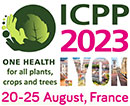Plant Pathology in a One Health World
Keynote session K1

University of Pretoria, South Africa

AgroParisTech, Paris-Saclay University, France

Université Félix Houphouët-Boigny,
Côte d’Ivoire
Title: Plant Health for ONE HEALTH in Central and West Africa

INRAE, National Research Institute for Agriculture, Food and the Environment, France
Title: What is the added value of One Health for plant health?

Food and Agriculture Organization of the United Nations (FAO), Rome, Italy.
Title: Antimicrobial use and resistance in plant agriculture: a one-health perspective.

Te Tira Whakamataki, Rangiora, New Zealand
Title: Empowering an indigenous perspective in the response to invasive pathogens
Food Security in an unsecure future
Keynote session K2

European Food Safety Authority EFSA, Italy

University of Pretoria, South-Africa

Canadian phytopathological society, Canada

Director General of CIMMYT, Mexico
Title: The Glen Anderson Lecture: Agrifood System for a Food and Nutrition Secure World: From efficiency to resilience.

University College Dublin, Ireland
Title: The beauty and complexity of wheat disease control

Biosciences Oak Ridge National Laboratory, USA.
Title: Crises Abound: Food Security, Health, Climate, Energy, Pandemics. How Supercomputing, AI, and Large-Scale Systems Biology in a OneHealth Framework Can Help Address the Major Challenges We Are Facing.
Invasive and Emerging Plant Diseases
Keynote session K3

EPPO, european and mediterranean plant protection organization, France

ANSES - french agency for food environmental and occupational health & safety, France

University of Torino, Italy
Title: Emerging diseases in the vegetable sector: challenges and perspectives (with Giovanna Gilardi and Massimo Pugliese as co-authors)

University College London, UK
Title: Pandemic clonal lineages of the blast fungus

Nederlandse Voedsel- en Warenautoriteit (NVWA), The Netherlands
Title: Risk assessment and management of pests and diseases in the EU: past and present
A Global Plant Health Assessment (GPHA) of the state of Plant Health and its Impact on Ecosystem Services
Keynote session K4

UC Davis, USA

INRAE, national research institute for Agriculture, Food and the Environment, France

Università Cattolica del Sacro Cuore, Italy
Title: State and evolution of plant health globally across Plant Systems and Ecoregions

GB Pant University of Agriculture & Technology, India
Title: Synthesis and implications of the findings from the GPHA

GB Pant University of Agriculture & Technology, India
Title: Impacts of plant health on services rendered by Plant Systems in Ecoregions
Current Topics in Molecular Plant-Microbe Interactions
Keynote session K5

Colorado State University, USA

The Sainsbury Laboratory, UK

Huazhong Agricultural University (China)
Title: Regulation of bacterial growth and behavior by plant immunity

John Innes centre, UK
Title: Factors that influence the distribution of vector-borne parasites

Duke University, USA
Title: Impact of climate on plant-pathogen/microbiome interactions
New Developments in Plant Disease Management
Keynote session K6

Bayer AG, Germany

University of Florida, USA

CIMMYT - International Maize and Wheat Improvement Center, Mexico
Title: Disease early warning and advisory systems – the case of wheat rusts

IITA- International Institute of Tropical Agriculture, Nigeria
Title: Advances in plant virus disease management in sub-Saharan Africa – the case of bunch top disease

2Blades Foundation, UK
Title: NLRseek™: High-throughput discovery pipeline for functional resistance genes
ICPP2023 BEST POSTERS AWARDS CEREMONY
Wed, 08/23/2023 Amphitheater 3000 15:30pm to 16:00pm
Typhaine Brual (pH.D student of University Lyon 1, France) & a committee of young plant pathologists

